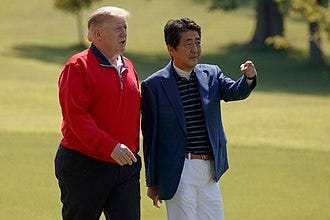One sleep till Liberation Day
The UK economy is in trouble, even if Trump's tariffs are rescinded

What might the implications of Trump's tariffs be for the UK? As the Financial Times’s Alan Beattie says, ‘no one knows anything’, even with one day to go, so we can’t know how bad it will be. We do know, however, that it will be bad. And it’s not apparent that playing golf with Trump would help.
Trump might impose a 25% tariff on cars and car parts on the UK. That would reduce exports to the US - but only £7 billion of exports would be affected, out of total exports of £800 billion. He might announce some convoluted scheme where tariffs are applied ‘reciprocally’ to make up for UK policies that the US Trade Representative does not like, such as VAT. Or he might go for 20% tariffs on everyone and on everything. Those scenarios would hit demand for UK output more.
Is there much the UK can do to avoid them? The British government, for its part, has said that it will not necessarily retaliate straight away, and has offered an economic deal - purportedly cutting the digital services tax on US tech giants, something on artificial intelligence, and something on agriculture. The digital services tax aims to recoup corporate tax from Big Tech, which dodges it by headquartering in low-tax jurisdictions like Ireland. Maybe the UK will commit not to follow the EU’s more safety-first approach to AI, as Starmer signalled by refusing to sign up to a French-inspired summit conclusions last month. Britain could promise to buy more soy beans, as Jean-Claude Juncker did in Trump’s first term, without having the power as European Commission president to do so - or it could remove some restrictions on imports of American produce.
Perhaps that would be enough, but the US is demanding cuts to VAT, which is charged across Europe on US imports. If the UK eliminated VAT for the US, it would offer US exporters a subsidy compared to UK producers, since VAT is charged on British goods consumed domestically. That would be costly. It would also violate WTO rules if only US imports escaped VAT, while it was still charged on other imports. So that isn’t something Britain can offer.
How much might tariffs blow Rachel Reeves off course? The impact on the economy and the public finances depends on the scale and duration of the trade war. If Trump calls off the tariffs at the last minute, or backs down after retaliation, the direct impact will be minimal. But it remains unclear whether his strategy is to use tariff threats as a tool to force concessions, or as a tool to cut US imports and revive US manufacturing. So no one knows when the next threats will come, even if the tariffs due tomorrow are withdrawn. That creates huge uncertainty, chilling investment globally. At a minimum, then, Trump's trade wars make it even more likely that further spending cuts or tax rises are coming in the Autumn budget - we just don't know how much at this stage.
Either way, the far bigger costs would arise from an escalating global trade war, even if a deal is done or the UK does not retaliate. Higher trade barriers would hurt demand in the EU and the US, with knock-on effects for British exports.
People have made much of the UK’s strength in services exports as an advantage in a world of Mad King trade relations. But on the flip-side, the UK is more affected by US financial volatility - British gilts tend to rise and fall with US Treasuries. So far, Trump’s policies have tended to push down the dollar and interest rates a little, because markets think a combination of tariffs, uncertainty, DOGE cuts to public spending, and fewer migrants and tourists travelling to the US will hit domestic consumption. We have been trained to think of tariffs as inflationary, but other mad economic policies might overwhelm the inflationary effect by chilling domestic demand in the US.
And rather than being stagflationary for the UK, the new world might be plain-old recessionary. If Trump’s tariffs stay in place and there’s no retaliation, or it’s limited, imports from the US will remain the same price, while demand for British exports will weaken. EU demand for British exports will weaken too, as uncertainty and retaliatory tariffs weigh on investment and consumer spending in our largest trade partner. Perhaps prices of imported goods will fall, offsetting some of these costs - the glut of Chinese EVs needs to be sold - but the impact on demand seems likely to be larger.
Two conclusions, then: we know it will be bad, but we don’t know how bad it will be; and beware arguments about a ‘nimble UK avoiding the costs of trade wars’. Our economy is too integrated with the EU and the US to be able to accomplish that feat.

